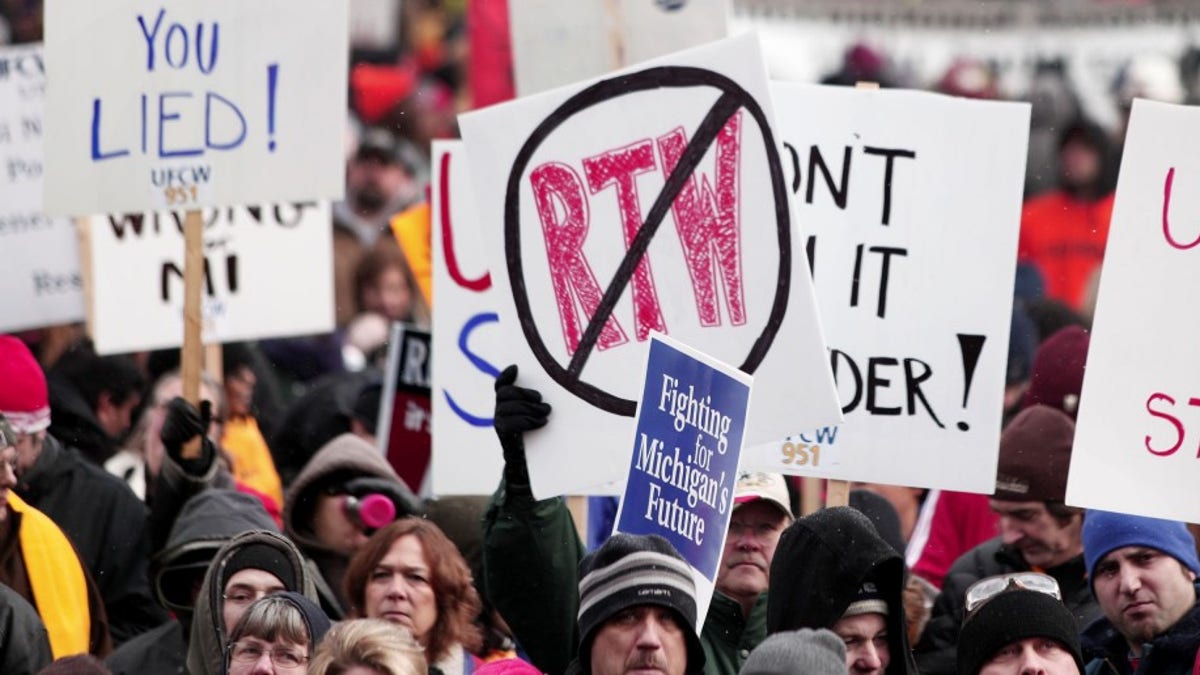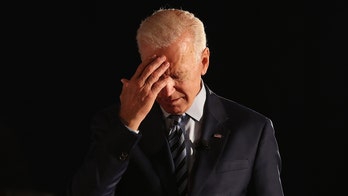
LANSING, MI, - DECEMBER 11: Union members from around the country rally at the Michigan State Capitol to protest a vote on Right-to-Work legislation December 11, 2012 in Lansing, Michigan. Republicans control the Michigan House of Representatives, and Michigan Gov. Rick Snyder has said he will sign the bill if it is passed. The new law would make requiring financial support of a union as a condition of employment illegal. (Photo by Bill Pugliano/Getty Images)
A panel of Kentucky lawmakers argued Thursday the state shouldoutlaw mandatory union dues or fees as a condition ofemployment.
The policy is better known as right-to-work. It’s law in25 states with several others currently considering it.At a luncheon hosted by the Covington Business Council, a panel offour state lawmakers asserted the policy is something Kentuckyshould enact as well. The panel included Mississippi and Kentuckystate Sens. Chris McDaniel and Damon Thayer as well as Kentuckystate Reps. Adam Koenig and Arnold Simpson. Democrats like Simpson,for the most part, tend not to agree with right-to-work laws.
“The best thing that we can do is to create an environmentwhere Kentucky is a place where companies want to come and tooperate,” McDaniel said according to The River City News.“Let’s keep our tax rates as low as humanly possible.We cannot be fooled that we are on an island. We are surrounded bycompetitors.”
For Koenig, the issue comes down to the upcoming governors race.Republican businessman Matt Bevin is facing off against DemocraticKentucky Attorney General Jack Conway for the office. Bevinsupports right-to-work while Conway doesn’t. Conway hasserved as the attorney general of Kentucky since2008.
“If Jack Conway is the next governor, then probably a lotof business issues will be status quo in a lot of ways and somepeople view that as a good thing,” Koenig also notedaccording to The River City News. “Some people don’t.If Matt Bevin wins, I think you might see more of a push for Rightto Work and repealing the prevailing wage which save untoldtaxpayer dollars.”
Critics of the policy say reining in union power will hurt theworking poor. They often claim unions are necessary for workplacefairness, better wages and benefits. Laws, therefore, should makeit easier for workers to join and unions to organize. The problemis, not all economists are in agreement. Right-to-work laws do notban unions or prevent workers from freely joining them. It simplymeans workers have the choice not to pay dues.
The disagreement has recently played out in a policy disputebetween The Heritage Foundation and the Economic Policy Institute(EPI). While EPI claims workers in right-to-work states get paid less on average, Heritage saysthe assertion is misleading. Accordingto Heritage, EPI needs to adjust for cost of living. Once thatis factored in, the difference in wages disappears. Essentially,right-to-work states may have lower wages but it costs less to livein them.
It is also not completely true that unions keep safety standardsup. The labor movement did indeed help historically to bringfundamental workplace protections. Nowadays, though, such protections are provided or required bythe government.
While the statewide debate continues, Kentucky has alreadytackled right-to-work in a different way. Supporters of the policyhave been getting counties to pass their own right-to-workordinances. Thus far, several counties have. It all started back inDecember. At the time Warren County approved a right-to-workordinance, making it the first county-level mandate in thecountry.
Several unions, however, have sued arguing counties are notallowed to enact their own right-to-work laws. The lawsuit, thoughfocused on Hardin, ultimately seeks to set a precedent which dismantles theordinances in any and all other counties. The lawsuit was filedback in January.
According to the United Automobile Workers and the eight otherunions behind the lawsuit, the policy violates federal law underthe National Labor Relations Act (NLRA). They say only states candecide whether they want to enact such a policy.




